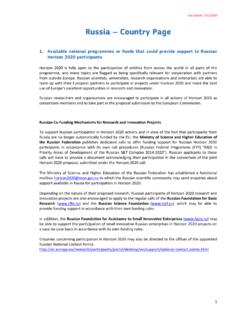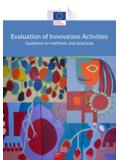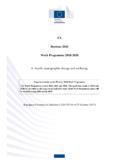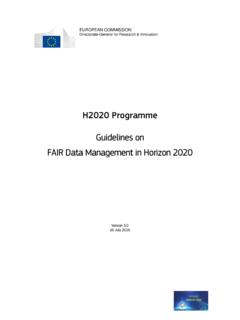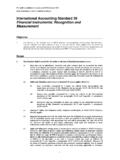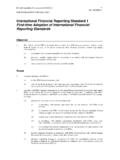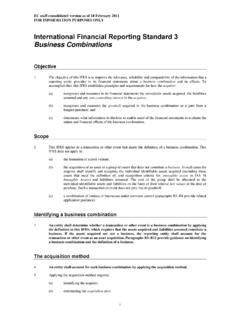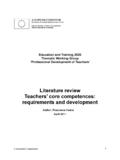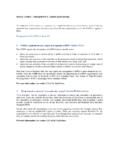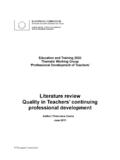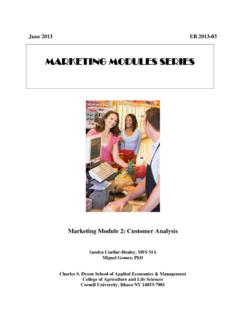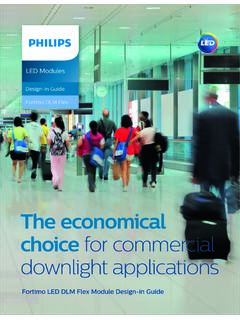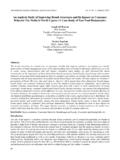Transcription of Consumer behaviour relating to the purchasing of ...
1 Designing policy to influence consumers: Consumer behaviour relating to the purchasing of environmentally preferable goods A project under the Framework contract for economic analysis 2nd Proposal Policy Studies Institute 50 Hanson Street, London W1W 6UP UK vrije Universiteit amsterdam 2 Contents Executive Summary ..4 1 Introduction .. 9 2 Project aims and outputs .. 11 3 Real world Consumer behaviour : literature 13 Introduction .. 13 How do consumers really make decisions? .. 15 Understanding Consumer decision-making.
2 23 Decision-making and short-cuts: the use of 'heuristics of judgment' .. 30 41 Identity, altruism and social 42 4 Case studies of real Consumer behaviour : .. 49 Introduction .. 49 Time discounting and energy saving: energy using products .. 49 Time discounting and food 49 Willingness not to choose and the use of energy defaults .. 50 Fuel efficiency, CO2 emissions and vehicle choice .. 53 Real world researcher behaviour .. 55 5 Understanding Consumer behaviour : evidence from product marketing .. 56 Introduction.
3 56 Food and drink .. 56 New 63 Consumer electronics .. 67 White goods .. 73 6 Implications for 78 Introduction .. 78 Key findings for policy-makers: a 78 Implications for policy: discussion .. 81 3 7 Product-specific policy opportunities .. 91 Implications for Consumer vehicles policy .. 91 Implications for Consumer food policy .. 93 Implications for Consumer electronics 94 Implications for white goods policy .. 95 Implications for energy and utilities .. 96 References .. 98 103 Annex 1: Full project 103 Literature review.
4 103 Real world case studies .. 105 Product-specific market 106 Policy briefings and testing process .. 107 Annex 2: Search terms and databases searched .. 108 Acknowledgements: The research team would like to thank all those who contributed to this project, including the policy-makers who willingly tested our briefings and the marketing professionals who provided insight during the briefing development. Thanks also go to Christian Hudson, research manager, for his challenging questions and, most of all, his patience.
5 4 Executive Summary Consumer behaviour in the real world often differs from that predicted by economics and policy. Drawing together evidence from behavioural economics and marketing, this project sought to explore Consumer behaviour relating to the purchasing of environmentally - preferable products. The project s research findings are based on the results of a review of behavioural economics and marketing literature, and additional research with marketing professionals. Contrary to the belief of many economists, consumers very rarely weigh-up the full costs and benefits of their purchasing decisions.
6 Instead, they are strongly influenced by emotional factors, the behaviour of other people, by habits, and by the use of mental short-cuts, which all help to speed up decision-making. Rather than being consistent, Consumer preferences have also been shown to be inconsistent, changing over time and according to the situation and the way in which information is presented. In turn, while information provision and choice are important, neither necessarily leads to improved Consumer decision-making or changes in Consumer behaviour .
7 A common feature of standard economic thought is the belief that when individuals make poor choices it is the result of misinformation or a lack of information. Both marketing and the behavioural sciences have proven this information-deficit model to be deeply flawed. In part, this stems from the fact that consumers rarely search out, read or properly digest all of the information that is available to them when making a decision. More fundamentally, the model neglects the wealth of other factors that determine individuals behaviour .
8 The most obvious finding to emerge from the research is that policy must take into account all of these different factors if it is to effectively influence Consumer choice. An improved understanding of Consumer behaviour gives policy-makers a wider range of policy instruments with which to achieve policy objectives. Used in the right circumstances, these instruments are likely to be more cost-effective than more traditional policy instruments. Policy should also remember Consumer behaviour is both context- and product-specific.
9 While the existing evidence on Consumer behaviour contained in this report provides guidance on how people make choices, policy-makers need to remember that Consumer responses will vary across product groups and policy areas. The six short 'policy briefs' produced to accompany this report provide the key pieces of policy-relevant information and advice on Consumer behaviour in relation to 5 purchasing (and sometimes use) of: private vehicles, white goods, Consumer electronics, food and drink, utility contracts.
10 Key findings: what do we know about Consumer behaviour ? Consumers rarely weigh up all the costs and benefits of choices. Instead, purchasing decisions may be made automatically, habitually, or be heavily influenced by an individual s emotions or the behaviour of others. This also means that consumers tend not to use all of the information available to them when shopping. Instead, people are more likely to read information when they perceive a benefit from doing so. Consumers use mental short-cuts to help speed up decision-making.
